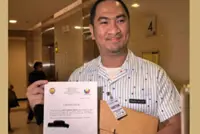When hackers targeted independent Filipino news outlet Bulatlat.com, flooding its website with a torrent of rogue traffic, staff had to rely on digital forensics experts in Sweden to track down the perpetrators.
“Building the case means you must come up with evidence. But digital forensics is something we simply don’t have any resources for,” said Frank Lloyd Tiongson of the National Union of People’s Lawyers, which represented Bulatlat over the 2018 attack.





